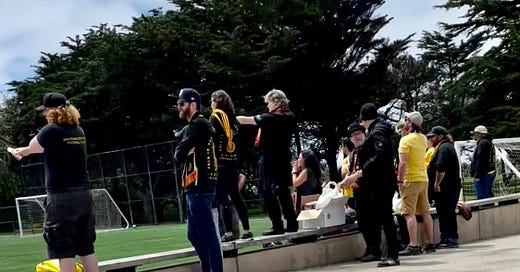Stop Heckling. Start Helping.
The fate of our democracy depends on the quality of our civic culture. That culture should not look to D.C. nor to Twitter for examples to follow.
“That’s why boys shouldn’t play with men!”
The cheering section for San Francisco City FC forgot they were watching a match between two squads filled predominately with beer-bellied old men reliving their junior college days. So, when a player for the other team went down in a brutal fashion and appeared to be actually injured (not just soccer injured), it was shocking to hear fans berate the young-ish looking fellow. When the coach of the opposing side heard the verbal assault, he approached the crowd and directly asked if they had any decency.
One of the fans quipped, “It’s a soccer match, we can say what we want.”
No, you can’t.
You can’t belittle someone playing in what effectively amounts to a community soccer match—at least not in a society that values respect for one another over your “side” winning a game that has zero ramifications other than who owes who a drink at the nearby pub.
Depending on the context, some lines should not be crossed. What passes as acceptable at a Timbers’ game may not in the context of an amateur contest. That lesson didn’t get picked up by these fans. They simply assumed what professional athletes have (unfairly and unfortunately) come to expect—horrible chants, name calling, etc.—applies to the barista turned goalie in the amatuer league. Sadly, these San Franciscans aren’t the only ones who seem to have forgotten the value of paying attention to context.
Just as City FC fans have picked up on the tactics of diehard MLS fans, community members seem to have learned from political pundits on national TV for what passes for acceptable democratic behavior. Two examples make that abundantly clear.
First, in early August, for the second time, “[h]eckling and outbursts” at a school board meeting in Central Oregon forced the volunteer school board members to delay the meeting. From the start of the meeting, a small but (overly) vocal group decided it was ok to disrupt the proceedings. One official was laughed at. Calm members of the audience left. The aggressive minority argued with officials just trying to get the meeting back on schedule.
“Who needs decorum?!”, the ruffians likely thought. After all, interrupting, protesting, and blocking are the tactics that make national headlines, why not apply them to the local school board meeting? Like the soccer fans, maybe they thought, “It’s politics, we can say what we want!”
Second, a chair of a school board for a district in the Willamette Valley told me that they had to threaten to ban individuals from all district buildings for a year because they refused to wear a mask at a meeting. The result of such a chaotic and tumultuous meeting is that community members will question whether attending such a meeting is worthwhile and, perhaps more importantly, safe.
What those ruffians did was place their own politics and own priorities over the needs of the community. With all due respect to the First Amendment, which ought to be protected and followed, by delaying and disrupting a meeting, these individuals denied others the opportunity to make their voice heard. That’s not democracy. The school board had set up a thorough process for hearing valid concerns about the district’s back-to-school plans. That process was torpedoed.
We should not and cannot look to the behavior of national pundits and officials to guide our behavior. Our local officials are usually also our neighbors, our shopkeepers, our coaches, and, hopefully, our friends. They deserve our respect, our patience, and our grace.
The fate of our democracy depends on the quality of our civic culture. That culture should not look to D.C. nor to Twitter for examples to follow. We’ve got to start at the community level. The absurd fans at that soccer game should have known their behavior was out of line. The disrupters in Central Oregon should have seen that their actions were unproductive. Reviving our civic culture starts with our immediate communities.
How can we resist the urge to follow the lead of the most bombastic, sensationalistic, and insular individuals?
First, build resilient communities. If we get to know those around us and the complex and nuanced aspects of where we live, then it’ll become harder to turn everything into a smaller battle in the political wars that take place at the national level.
Second, engage in dialogue with “the other side.” Start by reading Rep. Mark Owens’ piece in this blog, which you can find here.
Third, pay attention to what is going on at your local school board and city council. If you see local civic leaders trying their best and doing the right thing — tell them because they need to hear it right now. Go to their meetings and strive to be a model citizen by listening, engaging with others, and respecting those who are navigating an unprecedented time.
Kevin Frazier runs The Oregon Way between classes at the UC Berkeley School of Law. He grew up in Washington County and graduated from the University of Oregon.




